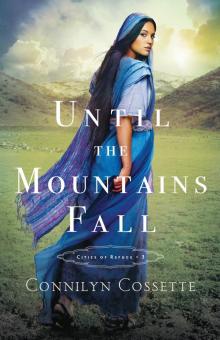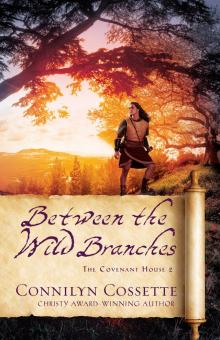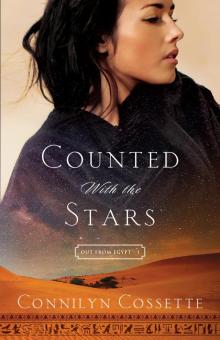- Home
- Connilyn Cossette
Between the Wild Branches Page 18
Between the Wild Branches Read online
Page 18
“Not angry,” he said, the words so soft I barely heard them. “Jealous.”
Again, his honest response surprised me. “Of their acceptance of Eliora?”
“No. I never questioned why they would love Risi so much. One cannot help but know that she is everything good in the world. It was her affection for them that I envied.”
“But she adored you. Her heart toward you never changed. I’m certain it still has not, regardless of your foolish decision to run away.”
“She was my sister,” he said. “My everything. For my entire life it had been just Risi and me. Truly, in many ways, she was a mother to me. And when we arrived in Kiryat-Yearim, it wasn’t only the two of us anymore.”
“You were angry that she wanted to be part of their family?”
“I suppose so. And I was angry that she kept me from Ashdod and all the things I thought I wanted. I begged her for months to go back. But she refused to even entertain the idea. I blamed Elazar and the others for persuading her to remain. The resentment festered inside me for so long that I was unable to look at any of it without bitterness, nor was I mature enough to see that I was blaming all the wrong people for all the wrong things.”
“I’m glad you did not succeed in convincing her to leave,” I said. “I cherished our friendship, secret though it was.”
“As did I.” The intensity in those words reached through the dark and curled themselves around my heart. We both went quiet, the stillness highlighting just how alone we were.
“I . . . I missed you,” he whispered.
I held my breath while my heart thumped about, wrangling with such an intimate confession.
“Lukio, you cannot say such things to me—”
“Do not misunderstand me,” he interrupted. “I am marrying Mariada, as the king has asked me to do, and I have no desire to dishonor her.”
My mouth dropped open as I processed the implications of his statement. “It was not your choice to marry her?”
“Although I’d hoped to marry soon, I hadn’t even met her. Only seen her from afar. The marriage is tied to my position, like any other political arrangement. I spent the last few years building myself into someone the king would appoint as the Master of Games, and he made it clear that my acceptance of the appointment included joining myself to his daughter.”
“Who did you plan to marry?” I heard myself asking before I could think better of it.
“I had no one specific in mind,” he said. “I only wanted someone to walk beside me. To fill the enormous house that I occupy with new life instead of merely the echoes of my own sandals.” He paused, and I heard a smile in his next words. “Although Igo has brought a fair amount of life to the place. And although he doesn’t trust me in the least bit, Zevi certainly brings his fair share of energy as well.”
I could not help but press into what he’d revealed. “You desire children?” I asked, hating the sickness that twisted inside of me at the image of Mariada growing round with his sons and daughters.
“I do,” he said. “I’ve always wanted a large family of my own. Like Elazar’s, in fact. I’d even once imagined that . . . with you.”
The last two words were barely above a whisper, but I felt them all the way down to my toes. My eyes stung as I dropped them shut, unable to push away the pictures they drew so vividly behind my lids. Lukio and me, together with my children—the children that should have been his. Asher would have loved to ride about on Lukio’s broad shoulders, and I had no doubt that Aaliyah would have had the man wrapped around her smallest finger.
“I need to go.” I forced out the words through lips that had gone numb. “I’ve been gone far too long, and I must get some sleep before Mariada wakes with the sun. Thank you for alerting us to the danger,” I said as I moved to press past him.
But instead of letting me go, Lukio somehow found me in the dark, loosely hooked his arm around my waist, and halted me before I could reach for the door. “There was a reason I asked Teitu to give you a shell, even before I discovered that your friend had been taken. I have some ideas of how to get you out of the city. Although it may be a few weeks before I can—”
“No. I told you I won’t leave without my daughter.”
“I know, I don’t expect you to. But you are not safe here. Either of you. And our mutual friend will help, I’m sure of it.”
I gasped. “You can’t tell him. What if he tells someone else? Tela could hear something and then I might lose my position.” Panic welled up, tightening my throat. “I need to be near her—”
His hand tightened on my waist. “It’s all right, Shoshana. I haven’t said anything yet. And he would not betray us. He is a man of honor. You’ve had enough interactions with him to know that, even if you don’t know who he is.”
“Even so, there are too many guards around this place to get her away undetected. There’s too much risk in attempting to smuggle an infant out without a sound. A cry from either Tela or the nursemaid would bring death down on all of us. It’s not time yet.”
“It’s not safe here,” he said. “The arrest of your friend should be proof of that. And I could not bear it if something happened to you.” There was a hum of something indefinable in the statement, something that reminded me of the piercing way his eyes had held me captive this morning in that valley. “Please, Tesi,” he whispered. “Let me help you. Let me help your daughter.”
I dropped my chin, breathing out a warbling sigh that he took for acquiescence.
“I won’t attempt anything without your permission, I promise.”
“And what is it you are planning?”
“I’ve decided nothing just yet. But I need you to trust me. I’ll let you know when the time is right.”
“I have a right to know what we are getting involved in,” I said, my frustration rising.
He groaned softly. “You always were a stubborn one, Tesi, nearly as much as Kalanit.”
My lips twitched at the subtle jab. The old red donkey in Elazar’s household had been named for a graceful poppy flower but was known for digging her hooves into the dirt at the most inopportune times.
“The boy who tended her was even more so,” I responded, returning the dig. “Where do you suppose she learned it?”
He chuckled, and the sound that vibrated in his chest burrowed beneath my skin. It was so much lower than it had been back when we were friends, but it had the same ability to warm me from the inside and make me feel safe. Cherished.
Thankful that he could not see me, I closed my eyes again. It didn’t matter what turbulent waters had passed between those innocent times and this fleeting moment of clandestine reconnection in a garden shed, I would never stop loving Lukio. And try as I might not to cling to false hope, I could not help but wonder if he would succeed in finding a way to get us out of the city, something I’d not been able to accomplish in all these months. Perhaps his betrothal to my mistress, and the influence his new position in the royal household afforded him because of it, would be a blessing after all.
I disentangled myself from him before I succumbed to the temptation to wrap myself around him and beg for him to run away with us too. But even if he regretted leaving Kiryat-Yearim the way he had, he’d given no indication that he wanted to return. He had wealth beyond belief here and the adulation of everyone in the city. His marriage to Mariada would secure those things for a lifetime, even if it meant remaining with the enemies of my people. What could he have in Kiryat-Yearim other than the simple life of a woodcutter, in a home that was not so much bigger than this garden shed?
Before I opened the door to escape into the night, I paused to speak over my shoulder. “I trust you. Leave me a shell when you are ready to share your plans.”
Twenty
Lukio
I did not remember much of my aunt Jacame or uncle Harrom’s funerals, only vague recollections of people wailing and the blood on my older cousin’s arms and legs after they’d cut their skin to display their gr
ief. But I did remember Risi standing next to me, holding my hand while she trembled. It was strange to miss my sister during the funeral procession for the king’s second wife, someone I’d never met, but the wave of longing for her soothing presence came over me, nonetheless. There was so much distance between us now, both physical and otherwise, but I would never stop missing her.
Up ahead of where Mariada, her mother, and I walked among the solemn procession was a wagon led by four majestic horses and decorated with garlands of flowers from the palace gardens. In the bed of the wagon was a brightly painted ceramic coffin in which Orada’s body had been placed, the second wife of Nicaro being honored by a royal burial befitting any queen. The frown on the face of Amunet when the extravagantly appointed wagon appeared in the courtyard had not escaped my notice, and I suspected it had nothing at all to do with regret over the loss of her rival for Nicaro’s attentions.
By the time the procession reached the area designated for burials outside the city walls, a large number of townspeople had gathered a short distance away from the royal family, their curiosity driving them to take part in mourning for a woman who’d been so sickly in the past few years that most of them would not have known her face should they see it in the street.
As we waited for the coffin to be unloaded from the wagon and the priests and priestesses to arrange the funerary implements, including two tall incense burners and a small two-horned altar, I could not help but be aware of Shoshana’s presence just behind Mariada and me. However, I did not look her way, no matter that my entire being protested the necessity of pretending she did not exist.
It had been two days since we’d spoken in the garden shed, since I’d nearly forgotten myself and hauled her into my arms right there in the dark to see if her lips were still as soft and sweet as I’d remembered from the one and only time when I’d had the courage to kiss her. It had taken a great amount of restraint to let her walk away once again, especially after admitting how I’d dreamed of having a family with her. When she returned my tease about Kalanit’s stubbornness, it had reminded me just how deeply I’d cared for her and made me realize that such affections had not withered with time. In fact, seeing her now as a woman, one who’d endured such terrible tragedy and yet was still so graceful and strong, only made her that much more compelling in my eyes. But I’d given my word to the young woman beside me, and I refused to dishonor her, no matter how much my soul ached for the one at my back.
Orada’s coffin lid was carefully removed and the family invited to bring forward their burial gifts. The first to approach was a loudly weeping Tela, supported by her husband, Virka. She placed what looked to be a carnelian necklace beside the linen-wrapped body before tearing the sleeve from her dress in a show of grief. Then, although Orada’s face was obscured by a mask of some sort, Tela bent to place a kiss on the grotesque representation of her mother’s notoriously beautiful features. One by one, the rest of the family followed Tela’s example, bringing all manner of gifts to place in the coffin and on the ground beside it—bowls, cups, carvings, idols, and other trinkets meant to ease her spirit in the underworld. A bevy of flowers, including the bouquet of lilies I’d laid near her feet, perfumed the air of the cemetery with something other than the stench of death that was already emanating from the body.
Finally, Nicaro himself stepped forward, dressed in ceremonial garb that reminded us he was not only king of Ashdod but Supreme High Priest of the city as well. Kneeling at Orada’s side, he bent the head he’d shaved as a sign of mourning over her death mask and remained in that position for so long that the crowd around me began shifting on their feet. However, no one dared to interrupt the king as he mourned.
The sun was nearing the edge of the horizon, falling golden over the sea, but still Nicaro did not move. Only after four priestesses lit their torches and positioned themselves to the north, south, east, and west around the king and the coffin did he stand and face the assembly. His blue eyes seemed particularly intense as he lifted his head to survey those gathered in honor of his wife.
“Orada, daughter of Sirute, born of the exalted tribe of Mijaru, one of the original clans to land on these shores, was a woman of great honor,” he said, his regal voice ringing out over the crowd. “She bore me four strong sons and a daughter with whom I am well pleased. Orada’s beauty will be spoken of for many lifetimes and the generations she gave birth to will endure for thousands of years.”
Only time would tell if his brash predictions would come true. The strong and prosperous city that he ruled suggested it might, but I’d heard another man speak words of foreknowledge, one who claimed to be a prophet of Yahweh, and I did not believe either of them could truly know the future.
“But for as much as she will be remembered for her regal grace,” he continued, “she will also be remembered as the victim of a heinous crime.”
A chill swept over my skin as the implications of his announcement sank in. It was just as Jaru had said: Shoshana’s friend was indeed being blamed for Orada’s death.
“A murderer slithered into my house. An enemy whose entire goal was to sow discord and to curse my beloved wife in the name of her foul god.”
A tense murmur went up in the crowd, especially in the townspeople. For Nicaro to state such an accusation so openly, to admit that an enemy had found a way to infiltrate the royal household, was a bold statement, one that did not cast Nicaro or his guards in a good light. But knowing how astute the king of Ashdod was, he had to have a motive for speaking so brazenly about such a failure in security.
“But fear not,” he said, “the evil one was rooted out after she was caught whispering curses over both my dying wife and her maid. And she has been brought to justice.”
I could practically hear Shoshana’s heart thumping from a few paces away, but I dared not turn around to see if she was holding herself together at the announcement that her friend had most likely been killed in retribution for something she had not done.
“We can only be grateful that this plot was uncovered before the Hebrew sow did any more damage to my household. For who knows what sort of destruction she could have caused unchecked.”
The fervor with which Nicaro unleashed on the innocent girl was startling. But I had the distinct sense that I was seeing the true king of Ashdod for the first time. He was ruthless. Shrewd. Willing to twist the truth into a tale that matched his purposes. Wondering if anyone else was shocked by the transformation before us, I allowed my eyes to skim over the faces around me and found my gaze crossing with none other than my cousin Mataro, who stood off to the side of the gathering. I’d only caught sight of him a few times since I’d made my break and thought him to be nothing more than a specter of my past that had quietly faded away, so I was stunned to see him here among the mourners, most of whom were either directly or indirectly related to the royal family. When he saw that I’d become aware of his presence, he raised his brows in a gesture of subtle challenge, seeming to dare me to call him out for being among the group. But as I’d determined to do weeks ago, I refused to let him have any hold over me, so I kept my face blank and turned my attention back to Nicaro.
One of the priests handed the king a small lidded pot decorated with sacred symbols that swirled over the surface in bold black and red. With both hands Nicaro lifted the vessel over his head.
“Behold,” he said, his voice taking on a distinctly religious tone, “the blood of the guilty one, taken as payment for that which will never again bloom on the cheeks of my beautiful rose.”
A choked sound come from behind me, and my entire body went stiff. Shoshana could not break down at this confirmation of her friend’s death and draw attention to herself, or it may very well be her own blood spilled next.
As if she were again standing beside me now to witness this travesty, my sister’s words from the past suddenly whispered into my ear. I remembered the day she spoke them to me with perfect clarity. Just before I met Shoshana, I’d come home after an alterca
tion with some of the boys down in town, and I’d used every Philistine curse I remembered to call down destruction on their heads. Instead of chastising me for my vitriol, Risi had slipped her arm around me and pulled me close to her side. “The gods we grew up with in Ashdod are nothing like the Hebrews’ God, Natan. He is not made of stone or wood. He hears those who call on his holy name for deliverance. Ask him to rescue you.”
Even though my instinct had been to lean into her and press my face into her shoulder, I stiffened in her hold, annoyed that she’d used the Hebrew name she’d given me, instead of the one I’d been called since birth. I did not understand why she’d embraced the ways of Elazar’s family so easily and without reservation.
“A Hebrew god doesn’t care anything for me,” I’d snapped.
“Elazar says that Yahweh holds no regard for our earthly heritage. He is the Eternal One, the One who existed long before there was any such thing as a Philistine or a Hebrew.”
I wished I believed her assurances now as I silently willed Shoshana to keep her grief contained. No god had ever come to my assistance, then or now. But perhaps, for Tesi’s sake, he would have mercy. . . .
My half-formed thoughts were scattered when Nicaro crossed to the flaming altar and removed the lid of the pot. Slowly, he poured some of the contents over the flames, the liquid gleaming scarlet as it trickled into the fire. Another of the priests dumped a basket of what looked to be hair mixed with leaves of some sort into the blaze. I assumed it must be the same hair Nicaro had shaved from his head to display his grief when Orada died. Then a priestess approached to pour a generous libation of wine into the center of the foul-smelling offering.
Once the sacrifice was complete, Nicaro returned to stand behind Orada’s coffin and placed the jar inside as the final burial gift before two of his men came forward to place the painted lid on the vessel and seal it with pitch.

 Until the Mountains Fall
Until the Mountains Fall Between the Wild Branches
Between the Wild Branches To Dwell among Cedars
To Dwell among Cedars Counted With the Stars
Counted With the Stars Shelter of the Most High
Shelter of the Most High Shadow of the Storm
Shadow of the Storm A Light on the Hill
A Light on the Hill Wings of the Wind
Wings of the Wind